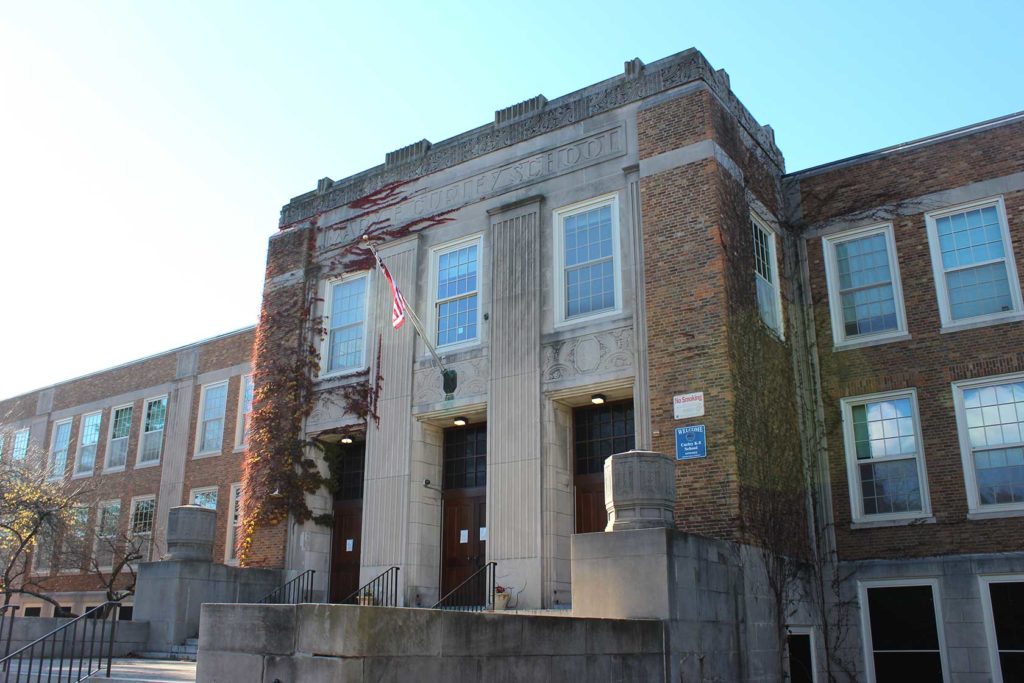COVID cases close Curley school
State discourages remote instruction plans

After shuttering its doors last week for a rapidly spreading COVID outbreak, the Curley School in Jamaica Plain now faces an additional challenge as state education officials say they won’t count the school’s remote instruction toward the mandatory 180 days required under state law.
BPS officials recorded 46 cases across grades and classrooms as a result of the outbreak, with some staff members also becoming infected. As a result, city officials, on the recommendation of the Boston Public Health Commission, decided to close the school. Closing Wednesday, Nov. 10, the school is set to reopen Nov. 22.
“This was of course not an easy decision for any of us,” BPS Superintendent Dr. Brenda Cassellius told the Boston Globe. “Temporarily closing the school is an active effort to stop the spread within the school community and beyond.”
Following the closure, school officials applied for those days to be counted in the 180 day school year. However, the Massachusetts Department of Elementary and Secondary Education (DESE) denied the request telling the Curley only four days would be eligible to be counted.
“BPS will not be able to count additional remote learning days from Wednesday, November 17 to Friday, November 19 towards the 180 required days at the Curley. As such, the Curley would need to be prepared to add three days to its school calendar,” DESE Commissioner Jeffrey Riley wrote in a letter to school and city officials on Friday.
He goes on to write, “Should BPS and/or the local health commission be unable to implement these steps or determine for any reason that it is not appropriate to re-open for in-person learning on Wednesday, November 17, the Curley may continue to offer remote learning at its discretion.”
Being remote for the seven days has already brought on frustration for parents and students, especially those with special needs.
“You have students that have special needs that are not receiving services,” said Ruby Reyes, Director of the Boston Education Justice Alliance. “And then there are the additional factors that affect families in terms of families having to work and parents having to take additional time off in order to stay home with children. So it’s a ripple effect.”
Now, educators, advocates and parents are left wondering how the outbreak progressed so quickly and if their students are at risk.
Erik Berg of the Boston Teachers Union said his organization is calling for an “independent investigation of the situation at the Curley so we can better understand what did happen and try to prevent it in the future.”
“And second,” he said, they’re calling for “the state testing vendor [to] increase their capacity to meet the needs of the students in the Boston public schools so that we can hopefully make further outbreaks like this less likely.”
As it is now, under normal circumstances the BPS uses a private contractor to conduct its testing and contact tracing of students. Using a “pool” testing system, which parents must opt-into on behalf of their students, classroom samples are tested together. Each student in a classroom is tested individually if the pool comes back positive.
However, after the outbreak began, rapid tests became the go-to for the Curley, but inevitably the quick spread made staying in the classroom impossible.
“We had up to 500 rapid COVID tests that we were having to give every single day, and we just weren’t able to keep up with that and make sure that we were able to contact trace,” Cassellius said during a Curley School community meeting last week. “And that’s as transparently as I can share with you how challenging this is.”
Tests are administered by CIC Health, which according to reporting in Commonwealth Magazine, has faced staffing shortages leading to delays getting the testing program off the ground. It is still unclear to what extent those delays contributed to the spike in cases at the Curley.
Action is now being demanded by organizers and concerned parties. Curley parent Jocelyn Stanton has sent a petition with over 100 signatures to state officials, including Governor Charlie Baker, to count all the remote-learning days in the official school year.
Additionally, a group calling themselves “BPS Families for COVID Safety” has been distributing a piece of literature that demands increased safety protocols for lunchtime when masks are not worn, and improved communication and transparency with families and administration as many parents complained they had not been notified of the outbreak until it was too late.
“We think that the interests of families and educators and students are aligned and hope that the recommendations that both BTU and the families have made are put into place,” Berg said.
And on the note of transparency, he added that if BPS and the state cannot meet these demands, they should be upfront about it.
“If they’re not able to do it because of capacity, people need to be informed of that,” he said.
The Curley is just the latest in a string of smaller outbreaks in Boston schools. Manning elementary, also in JP, had a smaller outbreak of 16 students earlier this month in addition to Orchard Gardens K-8 Pilot School in Roxbury. Both those outbreaks appear to be relatively contained.






